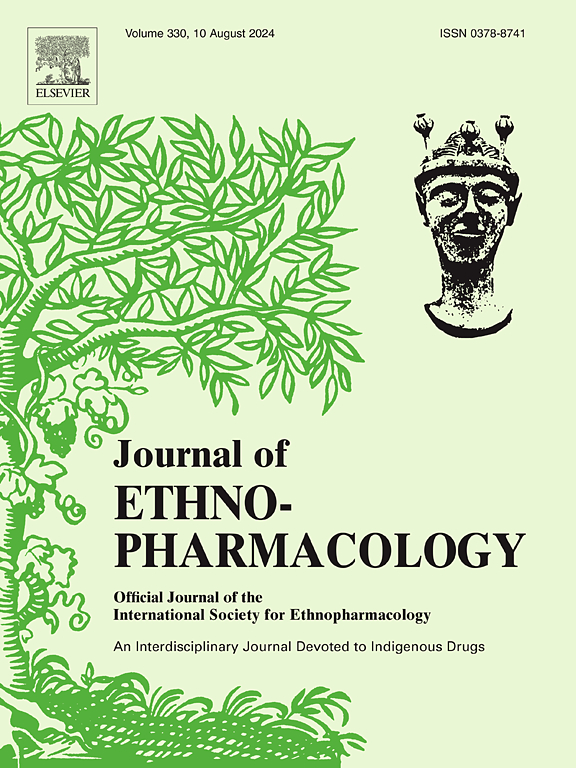Whether traditional Chinese medicine injection can reduce adverse events in patients with cancer? A meta-analysis of randomized controlled trials
IF 4.8
2区 医学
Q1 CHEMISTRY, MEDICINAL
引用次数: 0
Abstract
Ethnopharmacological relevance
Adverse events of anticancer treatment were common and debilitating in cancer patients. Traditional Chinese medicine injection (TCMI) plays an important role in the comprehensive treatment of cancer in China.
Aim of the review
To explore whether TCMI can reduce adverse events of anticancer treatment in patients with cancer.
Materials and methods
Ten databases (i.e., Embase, Web of Science, PubMed, ClinicalTrials.gov, the Cochrane Library, CBM, Scoups, CNKI, Wangfang Database and VIP) were searched up to July 2, 2024. RCT was included if it assessed TCMI in cancer patients and reported any type of adverse events. Data were extracted from eligible studies, and risk of bias was assessed using the RoB2 tool. Certainty of evidence was evaluated by the GRADE tool. Meta analysis was conducted by using random effects model. Subgroup and sensitivity analyses were performed for primary outcomes. The publication bias was evaluated for outcomes reported by more than 10 trials using funnel plots and Egger's test.
Results
A total of 76 eligible RCTs involving 9862 patients with cancer and 45 type of adverse events were included. Meta-analysis revealed that compared with anticancer therapy alone, combination treatment with TCMI had lower risk for adverse events in bone marrow suppression (RR 0.60; 95 % CI,0.51, 0.70) and gastrointestinal issues (RR 0.69; 95 % CI, 0.63, 0.76). Also, TCMI was associated with decreased risk of leukopenia (RR 0.67; 95 % CI, 0.61, 0.74), thrombocytopenia (RR 0.66; 95 % CI, 0.57, 0.77), hemoglobin reduction (RR 0.76; 95 % CI, 0.68, 0.86), neutropenia (RR 0.74; 95 % CI,0.59, 0.93), anemia (RR 0.57; 95 % CI, 0.48, 0.68), liver adverse events (RR 0.63; 95 % CI, 0.54, 0.74), renal adverse events (RR 0.55; 95 % CI, 0.43, 0.70), neurotoxicity (RR 0.70; 95 % CI, 0.61, 0.81), cardiovascular toxicity (RR 0.42; 95 % CI, 0.23, 0.77), radiation-induced injuries (RR 0.43; 95 % CI, 0.34, 0.54]), oral mucositis (RR 0.46; 95 % CI, 0.36, 0.58), fatigue (RR 0.66; 95 % CI, 0.48, 0.90), fever (RR 0.52; 95 % CI, 0.32, 0.85), infection (RR 0.48; 95 % CI, 0.32, 0.72) and chemotherapy toxicity (RR 0.95; 95 % CI, 0.36, 0.86). GRADE assessment indicated high certainty for evidence in bone marrow suppression, hemoglobin reduction, liver adverse events, renal adverse events and oral mucositis.
Conclusion
TCMI can reduce adverse events of anticancer treatment and serve as an adjuvant therapy. It is necessary to strengthen the mechanism research of TCMI and carry out more large-scale, multi-center and well-designed clinical studies to evaluate the synergistic effects of TCMI in the future.
中药注射剂是否能减少癌症患者的不良事件?随机对照试验的荟萃分析。
民族药理学相关性:抗癌治疗的不良事件在癌症患者中很常见且使人衰弱。中药注射剂在中国癌症的综合治疗中发挥着重要作用。目的:探讨中药是否能减少肿瘤患者抗癌治疗的不良事件。材料与方法:检索截至2024年7月2日的Embase、Web of Science、PubMed、ClinicalTrials.gov、Cochrane Library、CBM、Scoups、CNKI、Wangfang Database、VIP等10个数据库。如果评估癌症患者的TCMI并报告任何类型的不良事件,则纳入RCT。从符合条件的研究中提取数据,并使用RoB2工具评估偏倚风险。通过GRADE工具评估证据的确定性。采用随机效应模型进行Meta分析。对主要结局进行亚组分析和敏感性分析。使用漏斗图和Egger检验对10多个试验报告的结果进行发表偏倚评估。结果:共纳入76项符合条件的随机对照试验,涉及9862例癌症患者和45种不良事件。荟萃分析显示,与单独抗癌治疗相比,中药联合治疗骨髓抑制不良事件的风险更低(RR 0.60;95% CI,0.51, 0.70)和胃肠道问题(RR 0.69;95% ci, 0.63, 0.76)。此外,TCMI与白细胞减少风险降低相关(RR 0.67;95% CI, 0.61, 0.74),血小板减少症(RR 0.66;95% CI, 0.57, 0.77),血红蛋白降低(RR 0.76;95% CI, 0.68, 0.86),中性粒细胞减少症(RR 0.74;95% CI,0.59, 0.93),贫血(RR 0.57;95% CI, 0.48, 0.68),肝脏不良事件(RR 0.63;95% CI, 0.54, 0.74),肾脏不良事件(RR 0.55;95% CI, 0.43, 0.70),神经毒性(RR 0.70;95% CI, 0.61, 0.81),心血管毒性(RR 0.42;95% CI, 0.23, 0.77),辐射损伤(RR 0.43;95% CI, 0.34, 0.54]),口腔黏膜炎(RR 0.46;95% CI, 0.36, 0.58),疲劳(RR 0.66;95% CI, 0.48, 0.90),发热(RR 0.52;95% CI, 0.32, 0.85),感染(RR 0.48;95% CI, 0.32, 0.72)和化疗毒性(RR 0.95;95% ci, 0.36, 0.86)。GRADE评估显示骨髓抑制、血红蛋白降低、肝脏不良事件、肾脏不良事件和口腔黏膜炎的证据具有很高的确定性。结论:中药能减少抗癌治疗的不良事件,可作为辅助治疗。今后有必要加强中医中药的机理研究,开展更大规模、多中心、设计合理的临床研究,评价中医中药的协同作用。
本文章由计算机程序翻译,如有差异,请以英文原文为准。
求助全文
约1分钟内获得全文
求助全文
来源期刊

Journal of ethnopharmacology
医学-全科医学与补充医学
CiteScore
10.30
自引率
5.60%
发文量
967
审稿时长
77 days
期刊介绍:
The Journal of Ethnopharmacology is dedicated to the exchange of information and understandings about people''s use of plants, fungi, animals, microorganisms and minerals and their biological and pharmacological effects based on the principles established through international conventions. Early people confronted with illness and disease, discovered a wealth of useful therapeutic agents in the plant and animal kingdoms. The empirical knowledge of these medicinal substances and their toxic potential was passed on by oral tradition and sometimes recorded in herbals and other texts on materia medica. Many valuable drugs of today (e.g., atropine, ephedrine, tubocurarine, digoxin, reserpine) came into use through the study of indigenous remedies. Chemists continue to use plant-derived drugs (e.g., morphine, taxol, physostigmine, quinidine, emetine) as prototypes in their attempts to develop more effective and less toxic medicinals.
 求助内容:
求助内容: 应助结果提醒方式:
应助结果提醒方式:


